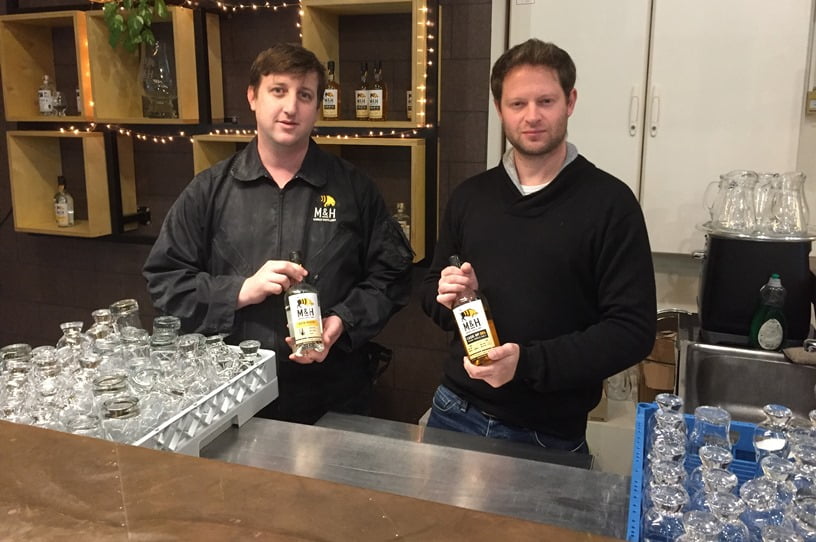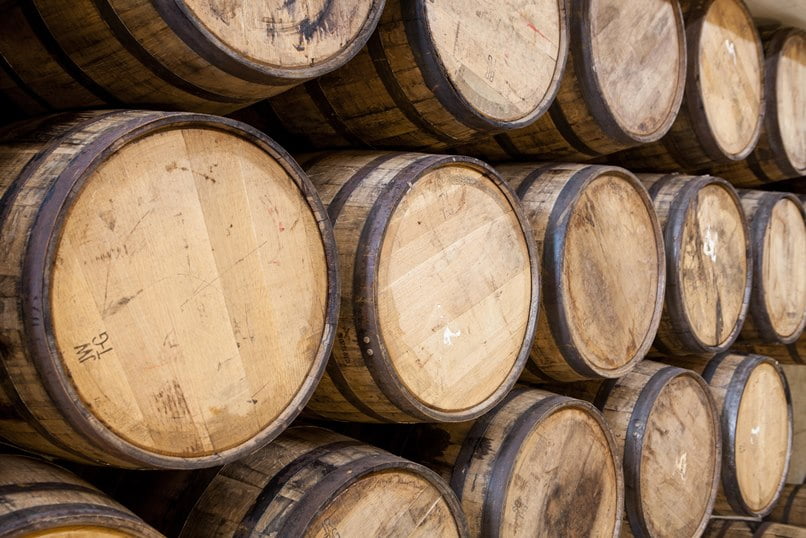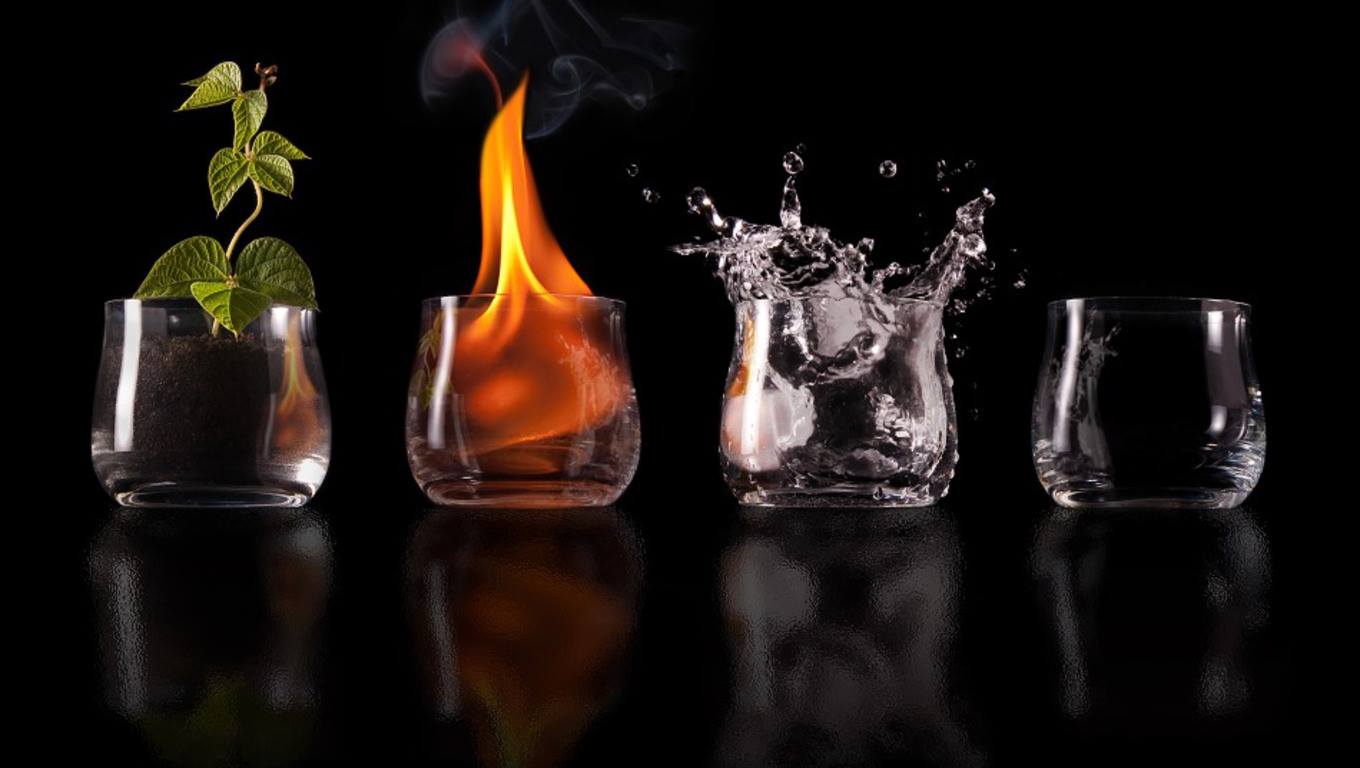The Holy Land’s first whisky distillery is ready to cater to the European palate, with the first shipments of the liquor hitting the market later this year.
Located in Tel Aviv, the Milk & Honey Whisky Distillery (M&H) produces spirits that combine Middle Eastern flavors (such as the locally grown spice za’atar) with a faster maturation process that is mainly a result of the warm Mediterranean climate.
SEE ALSO: Drinks On The House?! Israeli Smart Cup Earns You Free Beers
Upon entering the distillery, visitors are hit by the scintillating aroma of single-malt liquors hibernating in wooden barrels. Tasting M&H’s ‘New Make’ – an unaged whisky bottled immediately after distillation – one can notice how it glides smoothly across the palate and leaves a bittersweet sensation; while M&H’s ‘Levantine Gin’ has the exotic flavor of za’atar.
But the distillery’s flagship single-malt whisky will only be ready in 2019, in accordance with the Scotch standard of at least three years of maturation in barrels. It seems the founders of the Milk & Honey Whisky Distillery are exceptionally patient in the fast-paced world of Israeli startups. Aiming to produce fine whisky, the company believes that there can be no shortcuts.
“Buying a cow when you want milk”
Founded in 2012 by six high-tech entrepreneurs who share a passion for whisky, M&H is led by co-founder Gal Kalkshtein and by CEO Eitan Attir. “Founding the distillery was like buying a cow when you want milk,” Kalkshtein, a serial entrepreneur and the founder of investment firm GKI Group, tells NoCamels.
SEE ALSO: Living It Up In Downtown Tel Aviv: 5,000-Year-Old Egyptian Beer Mugs Discovered In Israel
The team spent two years studying the intricacies of producing top-notch whisky. They also sought the help of Dr. James Swan, a world-renowned Master Distiller and an expert on producing whisky in warm climates, who recognized the exciting possibilities that Israel has to offer.
Speeding up maturation by up to three times
This pioneering distillery combines time-honored tradition with technology and innovation. For instance, the team creates high-quality water using reverse osmosis, a process that filters impurities from water using a semi-permeable membrane. The subsequent processes of mashing, cooling and distillation are also carefully calibrated and monitored using advanced equipment.
According to Attir, the benefit of distilling whisky in Israel is that the country’s warmer climate speeds up maturation by up to three times. This means that a three-year-old Israeli whisky might taste similar to a nine-year-old Scotch whisky.
But the higher temperature also means that the “angel’s share” (the percentage of alcohol that evaporates from the barrels) is as high as 10 percent a year, compared to the annual 2 percent angel’s share in Scotland and the US. Nonetheless, this can be moderated using climate control technology. “We won’t use climate control in the first year and a half because we want fast-paced maturation from the heat,” says Attir. “But even with climate control, the taste of the whisky will be the same.”
SEE ALSO: Many Seniors Turn To Substance And Alcohol Abuse After Retirement, Study Finds
Sign up for our free weekly newsletter
SubscribeTo ensure the high quality of ingredients, the distillery imports malt from England and handpicks other Israeli grains. The team also meticulously selects its barrels for the aging process, some of which were previously used for maturing Israeli cabernet sauvignons.
“Using ex-red wine casks is common for the last few months of whisky maturation,” Attir explains. “But we put some of our spirit in such casks from day one, so at the end of three years, we will get a very unique taste.”
In order to craft unique flavors, the team will store whisky barrels in different climate zones. These include the North, including the Sea of Galilee, an area with lower temperatures; the coast of Tel Aviv; the mountains of Jerusalem; and the South, especially the Dead Sea, where temperatures are typically high.
“We have four different climate zones within a small country, each of which will affect the barrels differently,” says Attir. So far, the team has stored barrels in the distillery in Tel Aviv and near the Dead Sea.
“New World Whisky”
The market seems to be ripe for an Israeli whisky. Attir claims that there is strong global demand for “New World Whisky” – made outside the traditional countries of production – Scotland, Ireland, the US and Canada. His claim was evidenced in the success of the company’s crowd-funding campaign on Indiegogo in 2013. M&H founders raised over $77,000, 115 percent of their goal. In addition to the successful campaign, Kalkshtein also invested millions of dollars from his own money.
While M&H is the first whisky distillery in Israel, it is not the only one producing whisky. Pelter, a winery in the Golan Heights, started distilling whisky in November 2013, and the Golan Heights Distillery was established soon after M&H.
“We will be here for hundreds of years”
M&H has already tasted success. Its Levantine Gin won the gold medal at Terravino 2016, the Mediterranean Wine and Spirits Challenge; its New Make won the silver medal. While the company intends to market the New Make as a base for cocktails, Kalkshtein claims that “a master distiller of one of the biggest distilleries in Scotland told us that our New Make is good enough to drink on its own.”
New Make ($40) and Levantine Gin ($47) have so far been been sold only locally, but are expected to hit the European market later this year. The company has also sold two series of six- and eight-month old single malt spirits to give customers an idea of what their whisky will eventually taste like. When the flagship single-malt whisky is finally ready, it will be sold in Israel, Europe and the US.
“I believe that we will be sold out very quickly, and then we will need to build a factory that is 10 times bigger,” Kalkshtein tells NoCamels. “We want to build something that will be here for hundreds of years.”
Photos: Kirk D’Souza, M&H, Yifat Zohar for Milk & Honey
Related posts

Resilient And Nutritious New Plant-Based Milk Aims To Make A Splash

Chocolate From Cultivated Cocoa Comes Without Environmental Toll

Plastic Fantastic: Startup Takes PVC Back To Its Crude Oil Roots









Facebook comments